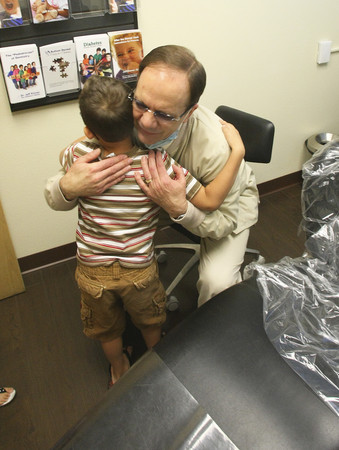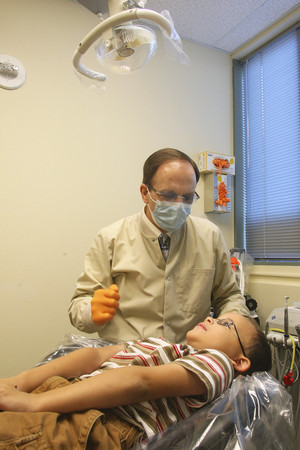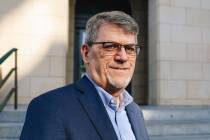TAKING TIME TO CARE: Dentist tries to put autistic children at ease
Dr. Jeff Kinner walks around the dental chair where 5-year-old Aiden March lies, making sure he makes eye contact with the child who seems to want to see everything in the room at once.
Once their eyes meet, he tells the boy precisely what he is going to do with the instrument he's holding.
"I am going to count your teeth now," he said, his calming voice like that of Fred Rogers, the late host of "Mister Rogers' Neighborhood."
"Yes, I am going to count your teeth now ... one, two, three ... you're doing great, you have beautiful teeth ... four, five, six. ... you're awesome ... seven, eight...."
It is a Monday, the day of the week that for the past two years Kinner has reserved in his dental practice for autistic children. He can only see 10 to 12 patients on Mondays, more than 20 patients fewer than he cares for on other days of his pediatric practice.
"You have to spend much more time with these children," Kinner said following the appointment. "But in my 26 years of practice in Las Vegas, I saw a very definite need in this area. I've now got 300 autistic children as patients. I've had so many parents tell me that they're so happy I don't have to sedate their child, or put them in a straitjacket or in the hospital to examine and clean their teeth. It's very rewarding to hear that."
Autism, a biological and neurological disorder, typically appears during the first three years of life. It causes children to have varying degrees of difficulty with communication and interpersonal relationships. It also causes obsessions and repetitive behaviors.
A study by the Centers for Disease Control and Prevention found that the complex developmental disability is four times more common in boys and occurs in 1 in 150 children.
"I've had some children on their first visit who were screaming, holding their ears, banging their heads or kicking the walls," Kinner said. "But later, after several visits, we're able to get their teeth cleaned without a problem."
Kinner, who does not have special-needs children of his own, said he hopes what he learns about treating the dental needs of autistic children can be passed on to other dentists.
"I don't believe I've learned enough yet to see that it is incorporated in the training of future dentists," he said. "But I'm seeing more and more of these children, and it is critical that their needs are handled correctly."
Jennifer Petrillo, executive director of Families for Effective Autism Treatment in Southern Nevada, said parents of autistic children in the Las Vegas Valley are thankful for the 52-year-old Kinner.
"The thing that we love about him so much is that he takes as much time as necessary to make our children comfortable," Petrillo said.
"He's definitely not making a profit working with our children, believe me. Sometimes he'll see them three or four times before he even touches them. He's so proud that he doesn't have to sedate them for an examination or cleaning."
Some fillings can be done using a local anesthetic. Others take sedation or hospitalization.
"That's on a case-by-case basis, on what you can get the child prepared for," Kinner said.
Kinner isn't the only dentist that sees autistic children in the valley, but Petrillo believes he is the only practitioner who sets a day aside for treatment and engages the children through an adaptation of the Applied Behavioral Analysis technique favored by therapists working with autism.
That means, she said, his practice includes establishing eye contact, calmly repeating instructions and praising good behavior while not drawing attention to poor behavior.
"Children with autism typically need a lot of repetition," Petrillo said.
Kinner said he could find little meaningful training on ABA techniques through seminars for dentists, so he learned from occupational therapists.
Despite the fact that autistic children might have a heightened fear of dental instruments and reactions to lights, sounds, touches and tastes and to someone standing close to them, Kinner is confident that if he and parents work together, they can get their children comfortable with a trip to the dentist.
"When a child becomes comfortable with a dental visit, I believe it shows that there is so much more he can accomplish," he said. "I have noticed that early intervention by parents with ABA specialists means so much to the child's development."
Aiden's mother, Meighan March, sat in a corner of the examination room where he was examined. Aiden's 3-year-old sister, Lauryn, sat on her knee.
At one point, Kinner told March that there was evidence that her son was grinding his teeth.
"I see that in 80 to 90 percent of my children with autism, and I don't know why," he said. "I haven't been able to find any studies on that."
March, a single mother who is a registered nurse, said the strides her son has made since he was diagnosed three years ago have been amazing. Her desire to learn all she can about how to work with autism, coupled with the help of ABA specialists, has made the difference, she said.
"Three years ago, I thought I was raising a sociopath. And now this year he's being mainstreamed into kindergarten. I now believe he'll go to college."
March said she found out about Kinner's work with autistic children about six months ago.
She had been preparing her son for his first dental visit for weeks.
"I put my finger in his mouth and rubbed on his teeth so he'd get used to something like that," she said.
To keep Aiden positive about the experience, she told her son, who loves the movie "Transformers," that Dr. Kinner would look for robots in his mouth.
If necessary, she told Aiden, Dr. Kinner might get the Megatron, or the bad robot, out of his mouth.
"It turned out Aiden wanted to go to the dentist, and he did great," she said.
Contact reporter Paul Harasim at pharasim@reviewjournal.com or 702-387-2908.


















